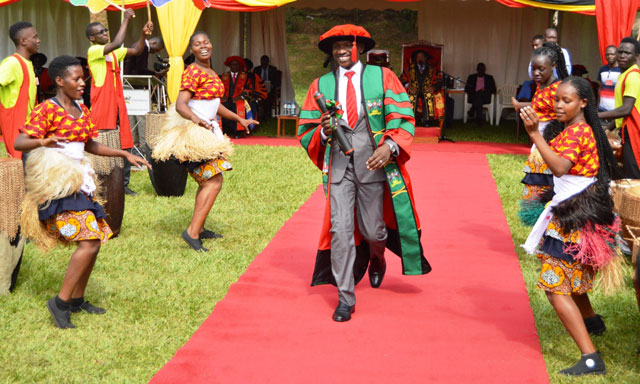
Kampala, Uganda | THE INDEPENDENT | Makerere University dons have renewed calls for government to provide scholarships for PhD (Doctor of Philsophy) students.
This was during the opening day of the annual forum for graduate research and policy dialogue held at Makerere University’s Yusuf Lule Teaching Facility on Thursday.
Makerere is organizing the two-day event which is merged with the annual doctoral convention under the theme of Regional Integration and Development to serve as a pivotal platform for fostering dynamic discourse among academia, policymakers, and stakeholders, aiming to bridge the gap between research and policy implementation in Uganda.
Several students use the forum to interact and share their research areas, critique concepts and proposals, and research outputs.
Professor Barnabas Nawangwe, the Makerere University Vice Chancellor who gave the keynote address said that Makerere has long advocated for scholarships for PHD students or loan schemes to increase the number of students that enroll in PhD programs.
Nawangwe also said that Makerere has for long wanted to graduate more PhDs in line with the World Bank’s call for African universities to produce at least 100,000 Ph.D. graduates annually. However, achieving this goal has been hindered by the high cost of PhD education.
He made reference to China which is growing at a high speed and put China’s development as the focus they injected in higher education and produced several Ph.Ds. He said if Uganda is to develop, it should replicate what is taking place in China.
Tuition fees for PhD students at Makerere University vary from 5 to 10 million Shillings per year, depending on the nature of their program of study.
Additionally, research expenses range from 10 to 20 million Shillings, a fee that poses a significant financial burden for many students and often compels many students to abandon their programs due to a lack of funds.
Speaking to URN on the sidelines, Nawangwe said that the university’s request for funding is not excessive. He proposed that a government investment of 3 billion Shillings in PhD scholarships could support more than 300 students across different universities.
It should be noted that; during the 74th graduation earlier this year, Makerere University graduated 132 Ph.D students, the highest ever for the university.
Professor Edward Baale, the Director of the Directorate of Research and Graduate Training said that there is evidence that the return on investment in higher education has outcompeted the investment in lower education, and used this to ask the government to fund PhDs because they can create businesses opportunities which are engines to economic growth.
Currently, the government only offers sponsorships to undergraduate students.
At least 4,000 students across different public universities including Makerere, Kyambogo, Mbarara, Busitema, MUBS, Kabale, Lira, Muni, and Gulu receive government sponsorship every year.
Dr. John Chrysostom Muyingo the State Minister for Higher Education who was the Chief Guest noted that the government is aware of the kind of impact that Education has on regional integration and therefore prioritizing it in their interest.
“Education and research play a pivotal role in driving regional integration and development. As a scholar and researcher, you are uniquely positioned to contribute to this noble endeavor. Your pursuit of knowledge and academic excellence holds the promise of transformative change, catalyzing innovation, progress, and inclusive growth.” He said.
One of the students Grace Adella who studies Energy, Economics, and Governance at MUBS presented their research paper; which examined the environmental influences on electricity reliability in Uganda’s grid system specifically looking at the reliability of Uganda’s electricity.
In her research, she revealed that Uganda experiences power outages approximately 84 times a month due to fluctuating water levels in Lake Victoria caused by climate variations.
In her recommendations, Adella proposed regional cooperation to manage Lake Victoria’s water levels consistently, which she believes could alleviate the challenge of electricity outages.
****
URN
 The Independent Uganda: You get the Truth we Pay the Price
The Independent Uganda: You get the Truth we Pay the Price





